Taiwan’s history is full of three-digit numbers indicating the month and day of major events: there’s 228 denoting the pivotal White Terror incident in 1947 and 921 for the devastating Jiji earthquake of 1999. Not quite as well remembered are 823, which represents the start of the Second Taiwan Strait Crisis of 1958 or, 524, the date of an attack on the US Embassy in Taiwan by rioters the year before.
One date that is now forgotten by all except the staunchest Chinese Nationalist Party (KMT) nostalgists is the snappiest of the lot: 123.
On Jan. 23, 1954, over 14,000 Chinese prisoners of war arrived at Keelung aboard US ships following an 88-hour voyage from Incheon, South Korea. Incarcerated for up to three years, these men had decided — often under severe duress from fellow inmates — on resettlement in Taiwan. A further 7,000-plus chose repatriation to China.
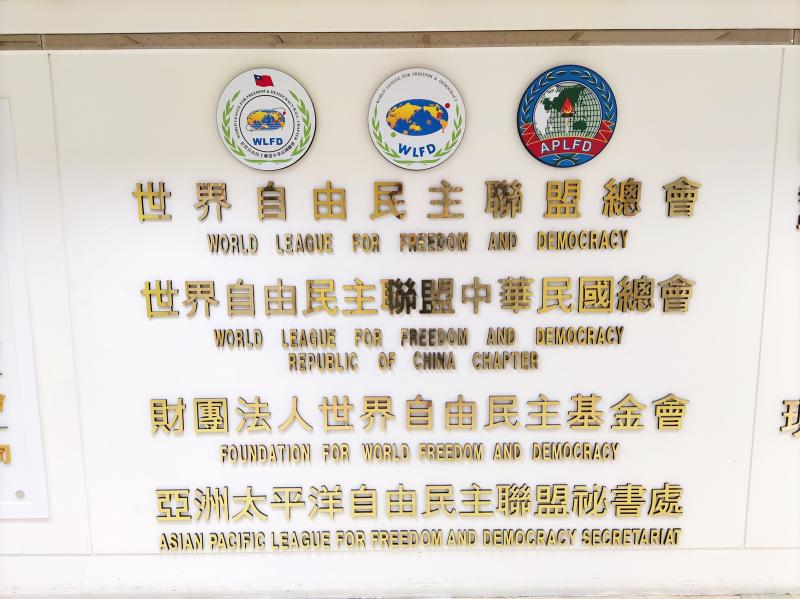
Photo: James Baron
It was a huge PR coup for former president Chiang Kai-shek (蔣介石). To maximize the propaganda, his government devised World Freedom Day (WFD). The event began under the auspices of the Asian Pacific Anti-Communist League, cofounded by Chiang, South Korean dictator Syngman Rhee and Philippines President Elpidio Quirino that same year. As rightist regimes worldwide got on board, the organization was renamed the World Anti-Communist League in 1966 (though the Asian Pacific league continued as a separate wing). In 1990, it rebranded as the World League for Freedom and Democracy (WLFD, 世界自由民主聯盟總會).
Since the first celebrations, the POWS have been feted annually. Early WFD events were held at the Grand Hotel and Zhongshan Hall in Ximending, until “budgetary constraints” forced a relocation to nearby Taipei Hero House (台北國軍英雄館), a hotel owned by the Friends of Armed Forces Association (軍人之友社).
With their numbers dwindling, only eight former POWS attended last year’s event. This year, none of these “anti-communist martyrs” will attend.
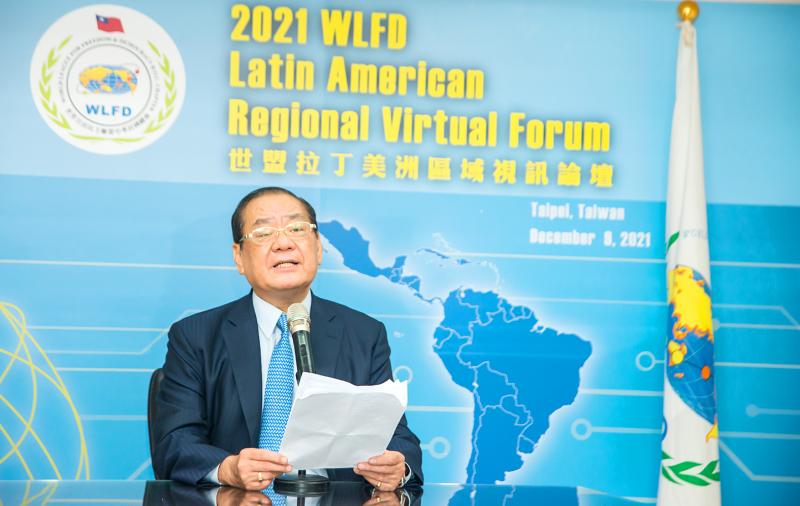
Photo courtesy of WLFD
“This is the first time they couldn’t come,” says Peter Lee (李呈祥), director of the WLFD’s Republic of China (ROC) chapter’s department of information services. “Since 1954, there’s never been a disruption. Unfortunately, because of COVID and their age, it wasn’t allowed.”
PARTY STALWARTS
Despite the absence of the star guests, the usual program of lectures will take place, with contributions from KMT figures such as former secretary-general Tseng Yung-chuan (曾永權), who heads the ROC chapter, and legislators Lin Te-fu (林德福) and William Tseng (曾銘宗). WLFD President Yao Eng-chi (饒穎奇), a one-time advisor to former president Ma Ying-jeou (馬英九), will deliver the keynote speech.
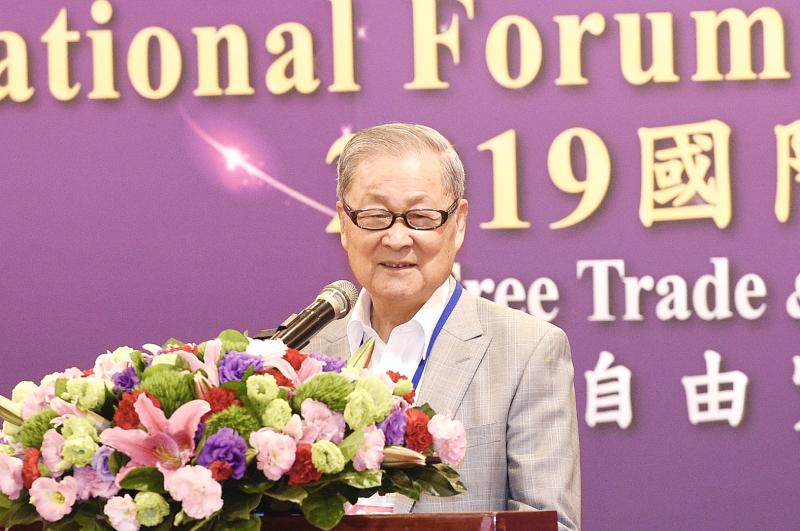
Photo: Liao Chen-hui, Taipei Times
The event employs the mantra “Deepen Freedom and Democracy to Promote World Peace,” but as the spawn of autocratic regimes, the organization’s history is at odds with this purpose.
“You have to understand the international surroundings of the time,” Lee, who is also secretary general of the secretariat for the Asian Pacific League, says. “Communism was much more aggressive than those president’s policies in their own countries. By today’s standards, you’d say they were too strict and not democratic, but only those connected to Communism were afraid of being tortured and persecuted.”
This is obviously not true. What of those falsely accused?
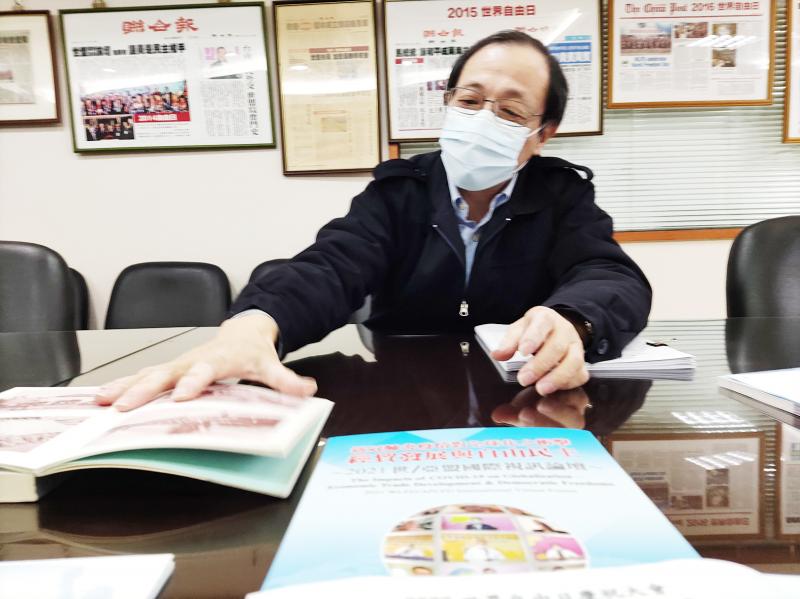
Photo: James Baron
“That’s inevitable. People are people, not gods. They make mistakes,” Lee says. “But you cannot say a regime is terrible because it made mistakes. For those who say they were innocent — you have to prove it.”
As for those Taiwanese who sought a third way and meaningful political participation, Lee insists they were a threat to stability. “They might be neither pro-Communist nor pro-Nationalist, but they wanted independence,” he says. “It might not be democratic, but we cannot afford to let you speak — I’m sorry I have to say that — because that kind of speech would probably promote violence and the country’s collapse.”
NOTORIOUS ALUMNI
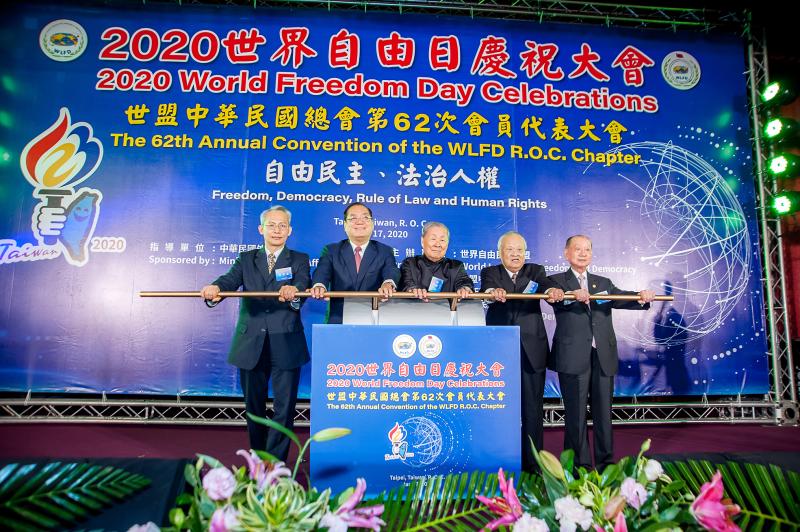
Photo: Peng Wan-hsin, Taipei Times
In 1986, a shocking account of what was then the WACL was published. Inside the League by investigative journalists Scott and John Lee Anderson, brothers who grew up in Taiwan, documented the WACL’s involvement with Nazi war criminals, assassins, gangsters, and Central American death squad commanders.
In the latter camp was Salvadoran Roberto D’Aubuisson, who was dubbed “Blow Torch Bob” due to his innovative interrogation techniques. A graduate of the Political Warfare Cadres Academy (政治作戰學校) at Fuxinggang (復興崗) in 1977, with support from the WACL, whose Salvadoran chapter he headed, D’Aubuisson was implicated in countless atrocities.
Accusations of embellishment aside, the book is a devastating indictment. Has the WLFD reflected on this period when it was implicated in horrific human rights abuses?
“Those countries run by right-wing groups did things in their own ways,” says Lee, stressing it was before his time. “We could not force them to stop the killing. But this book is not correct. We did not support those groups killing people. We only had the country chapters, which followed principles of freedom and democracy.”
OLD HABITS
These days, World Freedom Day and the league’s other events, such as the virtual forums held with regional chapters over the last two years, are pretty tame. It’s mainly hot air and platitudes — the constant references to freedom and democracy are mind-numbing — and there’s scant evidence of any influence on policymaking.
But old habits die hard, and claims of political intrigue continue to surface. Sources close to the government in Nicaragua, for example, indicate that the WLFD colluded with the Taiwan embassy to undermine President Daniel Ortega’s (undeniably repressive) administration throughout the Ma presidency.
While Lee talks down such allegations, it remains to be seen whether the WFLD can divest itself of its grubby historical baggage to become a disinterested force for good — an image it strives to project.
Asked whether there has been any change in the organization’s goals since it dropped the “anti-Communist” from its name, Lee is emphatic. “No difference,” he says. “We just changed the name; the principles are the same.”
For those with knowledge of the organization’s dark past, this is hardly reassuring.

Jacques Poissant’s suffering stopped the day he asked his daughter if it would be “cowardly to ask to be helped to die.” The retired Canadian insurance adviser was 93, and “was wasting away” after a long battle with prostate cancer. “He no longer had any zest for life,” Josee Poissant said. Last year her mother made the same choice at 96 when she realized she would not be getting out of hospital. She died surrounded by her children and their partners listening to the music she loved. “She was at peace. She sang until she went to sleep.” Josee Poissant remembers it as a beautiful

For many centuries from the medieval to the early modern era, the island port of Hirado on the northwestern tip of Kyushu in Japan was the epicenter of piracy in East Asia. From bases in Hirado the notorious wokou (倭寇) terrorized Korea and China. They raided coastal towns, carrying off people into slavery and looting everything from grain to porcelain to bells in Buddhist temples. Kyushu itself operated a thriving trade with China in sulfur, a necessary ingredient of the gunpowder that powered militaries from Europe to Japan. Over time Hirado developed into a full service stop for pirates. Booty could

Before the last section of the round-the-island railway was electrified, one old blue train still chugged back and forth between Pingtung County’s Fangliao (枋寮) and Taitung (台東) stations once a day. It was so slow, was so hot (it had no air conditioning) and covered such a short distance, that the low fare still failed to attract many riders. This relic of the past was finally retired when the South Link Line was fully electrified on Dec. 23, 2020. A wave of nostalgia surrounded the termination of the Ordinary Train service, as these train carriages had been in use for decades

Lori Sepich smoked for years and sometimes skipped taking her blood pressure medicine. But she never thought she’d have a heart attack. The possibility “just wasn’t registering with me,” said the 64-year-old from Memphis, Tennessee, who suffered two of them 13 years apart. She’s far from alone. More than 60 million women in the US live with cardiovascular disease, which includes heart disease as well as stroke, heart failure and atrial fibrillation. And despite the myth that heart attacks mostly strike men, women are vulnerable too. Overall in the US, 1 in 5 women dies of cardiovascular disease each year, 37,000 of them